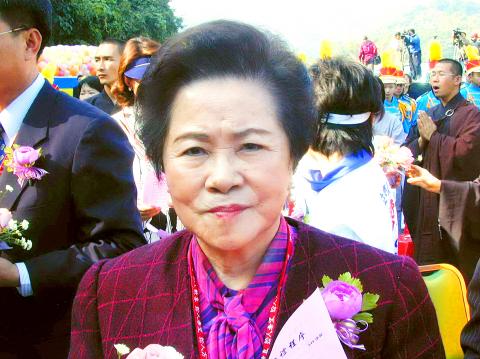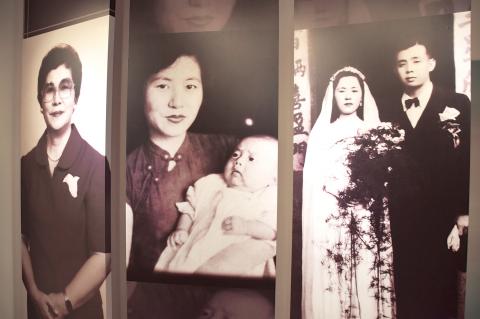Taiwan in Time: Nov. 28 to Dec. 4
Not many people’s lives change drastically when they are 38 years old.
Four months pregnant with her fifth child, Yu Chen Yue-ying (余陳月瑛) knew nothing about politics when she ran for the Taiwan Provincial Council in 1963 under the orders of her father-in-law, former Kaohsiung County commissioner Yu Teng-fa (余登發).

Photo: Hung Cheng-hung, Taipei Times
“I was not prepared at all,” she writes in the book, Memoir of Yu Chen Yue-ying (余陳月瑛回憶錄). “But the strange thing was that faced with such an important task, I did not panic.”
Yu Teng-fa , an independent politician, could not run because he had been dismissed from office and sent to prison in a scandal (Yu Chen writes that he was framed by the government). Because there were guaranteed seats for women in the assembly, Yu wanted to back a female candidate so that not all these seats would go by proxy to the ruling Chinese Nationalist Party (KMT).
“I believe that there must be competition for politics to improve,” Yu Teng-fa says in Yu Chen’s book. “I don’t think my son, daughter or daughter-in-law are better than others. It’s because I can’t find anyone brave enough to compete against the KMT.”

Photo: Su Fu-nan, Taipei Times
After much recruitment, Yu Teng-fa finally found a candidate to run for the assembly — but three days before the registration deadline, she withdrew due to family objections.
“That is why I was suddenly pushed into the role,” Yu Chen writes, as she admits that she won the top vote because of her father-in-law’s influence. But she did not expect that she would run for election and continue to win, remaining in public office for the next 30 years. And in 1985, she earned the distinction of being Taiwan’s first female county commissioner.
LEARNING ON THE FLY
Yu Chen says that her husband advised her to just stay quiet during the assemblies, but she writes that that was something she was “incapable of doing” — especially as part of the opposition.
“I was like a first-time student, I was taking notes and observing how other opposition politicians carried themselves,” she writes.
Her role model was fellow assemblywoman Hsu Shih-hsien (許世賢), who was Taiwan’s first female professor and would go on to become the country’s first female mayor in 1968.
“She always stood her ground and handled matters efficiently. She remained calm and was able to persuade people by reasoning,” Yu Chen writes. “In my 18 years as assemblywoman, I never insulted a politician. If you can’t force people to do things, you try other ways. Solving the problem is most important.”
“Through working for my constituents and seeking advice from my more experienced peers, I quickly learned the ropes of being a politician on my own,” she adds.
Yu Chen writes that she noticed the lack of true democracy in Taiwan during those days, and spoke out when the government decided to make village and borough chiefs appointed instead of elected. She also felt that the provincial government had too much power, and proposed that the provincial governor be elected as well.
She says she focused mostly on the basic problems of society, including farmers’ rights, election fraud and police abusing their power.
“I developed my political style during my first term,” she writes. “I stayed away from higher-level institutional problems, and did not try to fight ideological battles with government officials to highlight that I was part of the opposition. I worked for people’s welfare and their rights.”
Yu Chen ran for reelection in 1967 — this time on her own accord. She served a total of five terms in the assembly, then joined the legislature in 1983. She became Kaohsiung County commissioner in 1985 — following in the footsteps of her father-in-law and brother-in-law Huang You-jen (黃友仁), who were elected in 1960 and 1977, respectively.
The Yu family turned into a political dynasty as Yu Chen’s son, Yu Cheng-hsien (余政憲) succeeded her for two terms and also served as legislator and interior minister. Yu Cheng-hsien’s wife, Cheng Kui-lien (鄭貴蓮), served as a legislator and in the National Assembly.
Yu Chen’s other son and daughter, Yu Cheng-tao (余政道) and Yu Lin-ya (余玲雅), both served in the provincial assembly and as legislators.
Yu Chen left politics for several years after finishing her second term as county commissioner, but in 2000 she was named a senior advisor to then-president Chen Shui-bian (陳水扁), although she resigned in 2003 due to a financial scandal, ending a political career that was not even supposed to have happened.
Taiwan in Time, a column about Taiwan’s history that is published every Sunday, spotlights important or interesting events around the nation that have anniversaries this week.

Towering high above Taiwan’s capital city at 508 meters, Taipei 101 dominates the skyline. The earthquake-proof skyscraper of steel and glass has captured the imagination of professional rock climber Alex Honnold for more than a decade. Tomorrow morning, he will climb it in his signature free solo style — without ropes or protective equipment. And Netflix will broadcast it — live. The event’s announcement has drawn both excitement and trepidation, as well as some concerns over the ethical implications of attempting such a high-risk endeavor on live broadcast. Many have questioned Honnold’s desire to continues his free-solo climbs now that he’s a

As Taiwan’s second most populous city, Taichung looms large in the electoral map. Taiwanese political commentators describe it — along with neighboring Changhua County — as Taiwan’s “swing states” (搖擺州), which is a curious direct borrowing from American election terminology. In the early post-Martial Law era, Taichung was referred to as a “desert of democracy” because while the Democratic Progressive Party (DPP) was winning elections in the north and south, Taichung remained staunchly loyal to the Chinese Nationalist Party (KMT). That changed over time, but in both Changhua and Taichung, the DPP still suffers from a “one-term curse,” with the

Jan. 26 to Feb. 1 Nearly 90 years after it was last recorded, the Basay language was taught in a classroom for the first time in September last year. Over the following three months, students learned its sounds along with the customs and folktales of the Ketagalan people, who once spoke it across northern Taiwan. Although each Ketagalan settlement had its own language, Basay functioned as a common trade language. By the late 19th century, it had largely fallen out of daily use as speakers shifted to Hoklo (commonly known as Taiwanese), surviving only in fragments remembered by the elderly. In

William Liu (劉家君) moved to Kaohsiung from Nantou to live with his boyfriend Reg Hong (洪嘉佑). “In Nantou, people do not support gay rights at all and never even talk about it. Living here made me optimistic and made me realize how much I can express myself,” Liu tells the Taipei Times. Hong and his friend Cony Hsieh (謝昀希) are both active in several LGBT groups and organizations in Kaohsiung. They were among the people behind the city’s 16th Pride event in November last year, which gathered over 35,000 people. Along with others, they clearly see Kaohsiung as the nexus of LGBT rights.